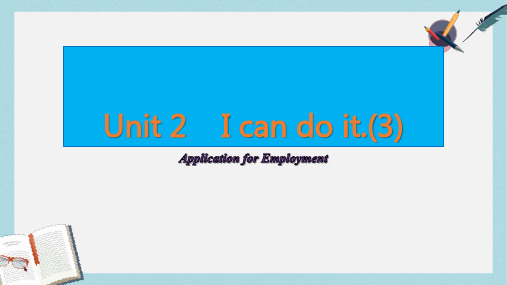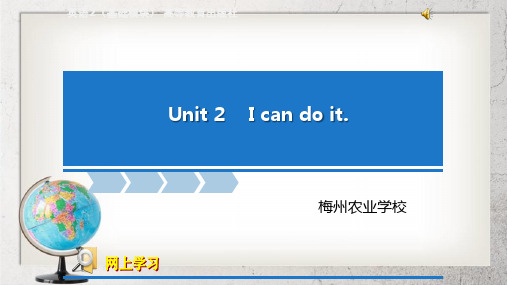高教版Book-1-Unit-2--I-can-do-it!教学设计一等奖汇编
- 格式:doc
- 大小:59.00 KB
- 文档页数:6

Book 1 Unit 2 I can do it!(第一课时教学设计)一、教材与学情分析本课是高教版基础模块1第二单元的第一课时,该课的具体内容主要是描述个人能力的词汇,有关个人能力的描述,询问和谈论能力的语句。
该课为整个单元的学习活动做好了语言和知识的准备,通过个人能力的描述及向别人了解能力等系列活动还利于教师挖掘学生的多元智能,增强学生的相互了解。
该课的内容贴进学生生活,词汇量少,句型简单易学。
职业学校的学生普遍英语基础薄弱,学生英语的积极性不高,能主动开口说的学生就更少。
但职业学校的学生具有思维活跃,好奇心重,集体荣誉感、竞争意识强,接受能力快的特点。
为此我对教材的内容进行了整合,依据教学目标增减、改动了一些教材内容。
整堂课的设计如下:二、教学目标1. 知识目标.(1)学生能掌握描述个人能力的词汇,如speak Chinese, drive cars, repair computers。
(2)学生能掌握询问和描述个人能力时所使用的句型,如:Can you sing English songsYes, I can. No, I can’t.2. 能力目标(1)学生能听懂关于询问和描述个人能力的对话。
(2)学生能罗列个人能力,并询问和了解同学的个人能力。
3. 情感目标)学生能欣赏自我,欣赏他人。
三、教学重、难点1. 教学重点(1)掌握描述个人能力的词汇(2)情态动词can的用法(肯定式、否定式、疑问式及其回答)2. 教学难点通过与个人能力描述相关的词汇和句型的学习,学会采访同学,并写出能力报告。
、四、教学步骤Step One: Lead-instudents some sentences from the song “I believe I can fly”, and ask students to pay attention to the word ”can”If I can see it, then I can do itIf I just believe itThere's nothing to itI believe I can fly:I believe I can touch the skystudents a group of pictures,and ask students to answer the questions:T: Who is he Ss: He’s Yao Ming.T: What can he do well Ss: He can play basketball well.(设计意图:以优美的歌曲及以学生所熟悉的人物吸引学生注意力,拉近师生距离,自然引出本课的教学重点)students the learning objectives of this lesson.知识目标(1)学生能掌握描述个人能力的词汇,如speak Chinese, drive cars, repair computers。

Unit 2 I can do it!(1课时教学设计)Topic:I can do it!Class hour:1学时Lecturer:张燕凌Contents (seven parts)1.Analysis of the teaching material2. Analysis of the students3.Teaching aims4.Teaching important and difficult points(说重、难点)5.Teaching methods6.Teaching aids7.Teaching procedures(blackboard design and conclusion)一、Analysis of the teaching materialThis is the first class in the 1 and second unit of the English module in secondary vocational school. The main content of the course is to describe the vocabulary of individual ability, the description of individual ability, the ability to ask and talk about ability. The class learning activities for the entire unit to language and knowledge, multiple intelligences through personal ability and ability to understand others to describe the series of activities to develop students' teachers, enhance mutual understanding of students. The content of this lesson is put into the students' life, with little vocabulary and simple sentence patterns.二、Analysis of the studentsVocational school students generally weak foundation of English, students are not high enthusiasm for English, students who can take the initiative to speak less. However, students in vocational schools have the characteristics of active thinking, curious curiosity, collective sense of honor, strong sense of competition and quick reception. For this reason, I have integrated the contents of the teaching materials, and changed or changed some teaching materials according to the teaching objectives. The whole class is designed as follows:三、Teaching aims1. Knowledge Aims(1) students can grasp the description of individual ability of vocabulary如speak Chinese, drive cars, repair computers。

Book1 Unit 2 I can do it!(第一课时教学设计)一、学情分析本单元是教材的第二单元,关于个人能力描述,要求能进行口头能力描述,向别人了解能力,能看懂求职表,根据求职表安排合适的工作岗位,填写求职表等,实用性强,内容贴近学生生活,新的词汇量不大,句型简单。
但是职业学校的学生通常会说却不能正确拼写单词,会七嘴八舌地说出许多词组,但是不能长段地独立表达个人观点,课堂热闹但是课后较少主动复习。
因此,教学中应重视基本词汇的四会,重视指导性作文的写作,重视指导学生养成课堂记笔记的能力。
职业学校的学生普遍发散性思维较强,教师可以充分利用集体的力量开展教学,集思广益。
二、教材分析1.教学内容本课时系教材《英语1》(基础模块高教版)第二单元的第一课时,包括Lead-in & Listening and speaking中的Dialogue A两部分,具体内容为:描述个人能力的词汇、询问和谈论能力的语句。
这些内容为整个单元的学习活动做语言和知识的准备,也为学生用英语流利表达个人能力提供了模版,还利于教师挖掘学生的多元智能,学生间进一步促进了解。
2.教学重点、难点⑴教学重点通过与个人能力描述相关的词汇和句型的学习,学生采访同学、老师,并拟写采访单。
⑵教学难点学生了解词汇记忆的策略之一——分类记忆;学生区分出不同购物场所的特点;三、教学目标1.知识目标⑴学生能掌握描述个人能力的词汇,如speak Chinese, drive cars, repair puters, teach English, read in Chinese, serve customers。
⑵学生能掌握询问和描述个人能力时所使用的句型,如:Can you say something about yourselfCan you sing English songsWell, I can teach English and I can speak a little Chinese.2.能力目标⑴学生能听懂关于询问和描述个人能力的对话。

Unit 2 I can do it说课稿山阳职教中心韦霞各位领导,老师:下午好!今天我说课的课题是Unit 2 I can do it。
下面我对本课题进行分析:一、说教材(地位与作用)Unit 2 I can do it中的Lead-in &speaking是高等教育出版社教材第2单元第一课时。
本课题的理论、知识是学好以后课题的基础,它在整个教材中起着承上启下的作用。
二、说教学目标:根据本教材的结构和内容分析,结合着12秋数控,电子专业学生的认知结构及其心理特征,我制定了以下的教学目标:1. 知识与技能目标:(1)学习情态动词“can”的基本用法。
(2)在对话中学习如何询问和讨论能力。
2. 过程与方法目标:通过看图讨论,自我归纳总结,小组讨论的方法。
3. 情感与价值观目标培养学生的合作精神和自我创新意识。
三、说教学的重难点教学重点:学习情态动词“can”的基本用法。
教学难点:学习情态动词“can”的基本用法。
四、说教法。
考虑到12秋数控、电子版学生的现状,我主要采取设置情景教学法,让学生积极主动地参与到教学活动中来,使他们在活动中得到认识和体验,产生践行的愿望。
培养学生将课堂教学和自己的经验结合起来,引导学生主动去发现周边的客观事物,发展思辩能力,注重滨心理状况。
当然老师自身也是非常重要的教学资源。
教师本人应该通过课堂教学感染和激励学生,调动起学生参与活动的积极性,激发学生对解决实际问题的渴望,并且要培养学生以理论联系实际的能力,从而达到最佳的教学效果。
基于本课题的特点,我主要采用了以下的教学方法:1.直观演示法:利用图片等手段进行直观演示,激发学生的学习兴趣,活跃课堂气氛,促进学生对知识的掌握。
2.活动探究法:引导学生通过创设情景等活动形式获取知识,以学生为主体,使学生的独立探索性得到了充分的发挥,培养学生的自觉能力、思维能力、活动组织能力。
3.集体讨论法:针对学生提出的问题,组织学生进行集体和分组语境讨论,促使学生在学习中解决问题,培养学生团结协作的精神。

Unit Two I can do it第三课时A Job Interview国际商务专业拓展教学设计教材:高等教育出版社出版的《英语.基础模块1》教学内容:Unit 2 I can do it 第三课时Job Interview授课年级班级:高一年级1203国际商务班授课时间:一课时授课类型:speaking class设计理念:新课程理念提倡英语课程教学重点要培养学生的综合能力,以及中职生的专业水平和职业能力。
由于中职学生英语基础差,学习动机不浓,学习兴趣不强,传统英语教学的教学方法和教学模式已经不能适用新时代的中职英语课程教学。
如何在英语教学中提高学生英语学习兴趣和学习效果、发展学生专业能力和职业能力,成为了中职英语教师必须面对的一个问题。
本人尝试进行英语课程的改革和创新,将学生的专业知识学习融入到英语课程中开展教学活动。
《英语.基础模块1》第二单元Unit 2 I can do it学习如何表述个人能力。
第三课时A Job Interview是本单元的一堂教学拓展和延伸课。
在教学材料处理上,教师以学生的专业方向为拓展目标,以课本为基础,针对国际商务专业学生的特点,对教材的内容进行适当地补充和删减,融合了与学生的专业相关的学习内容。
本课时的学习内容就是教师新增加的学习模块。
该模块的主要内容是让学生在已经学会使用can 表述self-abilities的基础上进一步学习与个人专业能力相关的知识,并运用自己所学知识参与模拟面试活动,介绍自己的个人专业能力,与面试考官进行交际互动。
本人除了对教学内容的整合以外,还试图运用各种教学模式进行课堂改革。
在本课时的教学设计中,本人设计了多种教学模式开展教学活动。
如在课堂的呈现阶段,教师通过让学生观看影片启发学生的思路,激发学生的学习兴趣,学习表述个人专业才能的单词,扩大学生词汇量。
当引导学生学习完与其专业能力相关的英语词汇后,教师利用多媒体和网络技术让学生观看一个有关求职失败的教学案例,利用这个案例引导学生采用问题式学习法进行案例分析,通过小组合作的方式找出求职者求职失败的原因以及他所缺少的必备能力有哪些。


《I Can Do It!》说课稿尊敬的各位评委、老师们:大家好!今天我说课的题目是《I Can Do It!》。
下面我将从教材分析、学情分析、教学目标、教学重难点、教学方法、教学过程以及教学反思这几个方面来展开我的说课。
一、教材分析《I Can Do It!》是教材版本教材中的一篇重要课文。
这篇课文以生动有趣的方式展现了各种不同的能力和活动,贴近学生的生活实际,能够激发学生的学习兴趣和积极性。
教材中的内容编排合理,通过丰富的图片和简洁明了的文字,引导学生学习与能力相关的词汇和句型,同时也注重培养学生的语言运用能力和思维能力。
二、学情分析本次授课的对象是具体年级的学生,他们已经具备了一定的英语基础知识,对英语学习有着较浓厚的兴趣。
但这个阶段的学生在语言表达和理解上还存在一定的局限性,需要通过多样化的教学方法和活动来引导他们积极参与课堂,提高语言综合运用能力。
三、教学目标1、知识目标(1)学生能够掌握与能力相关的词汇,如:run, jump, swim, dance 等。
(2)学生能够熟练运用句型“I can” 来表达自己能做的事情。
2、技能目标(1)能够听懂关于能力的简单对话和指令。
(2)能够用所学句型进行简单的口语交流,描述自己的能力。
3、情感目标(1)培养学生的自信心,让他们敢于表达自己。
(2)激发学生对英语学习的兴趣,培养积极向上的学习态度。
四、教学重难点1、教学重点(1)掌握重点词汇和句型。
(2)能够正确运用句型“I can” 进行表达。
2、教学难点(1)如何引导学生在实际情境中灵活运用所学句型进行交流。
(2)培养学生的语言综合运用能力和思维拓展能力。
五、教学方法为了实现教学目标,突破教学重难点,我将采用以下教学方法:1、情景教学法通过创设生动有趣的情景,让学生在真实的语境中学习和运用语言,提高语言的实际运用能力。
2、游戏教学法采用游戏的方式,激发学生的学习兴趣和积极性,让学生在轻松愉快的氛围中学习英语。


U n i t-2--I-c a n-d o-i t!教学设计一等奖Unit 2 I can do it!(1课时教学设计)Topic:I can do it!Class hour:1学时Lecturer:张燕凌Contents (seven parts)1.Analysis of the teaching material2. Analysis of the students3.Teaching aims4.Teaching important and difficult points(说重、难点)5.Teaching methods6.Teaching aids7.Teaching procedures(blackboard design and conclusion)一、Analysis of the teaching materialThis is the first class in the 1 and second unit of the English module in secondary vocational school. The main content of the course is to describe the vocabulary of individual ability, the description of individual ability, the ability to ask and talk about ability. The class learning activities for the entire unit to language and knowledge, multiple intelligences through personal ability and ability to understand others to describe the series of activities to develop students' teachers, enhance mutual understanding of students. The content of this lesson is put into the students' life, with little vocabulary and simple sentence patterns.二、Analysis of the studentsVocational school students generally weak foundation of English, students are not high enthusiasm for English, students who can take the initiative to speak less. However, students in vocational schools have the characteristics of active thinking, curious curiosity, collective sense of honor, strong sense of competition and quick reception. For this reason, I have integrated the contents of the teaching materials, and changed or changed some teaching materials according to the teaching objectives. The whole class is designed as follows:三、Teaching aims1. Knowledge Aims(1) students can grasp the description of individual ability of vocabulary如speak Chinese, drive cars, repair computers。


高教版Book1 Unit2 I can do it. 教学设计Book1 Unit2 I can do it.(第一课时)一、教材与学情分析本课是高教版基础模块1第二单元的第一课时,该课的具体内容主要是描述个人能力的词汇,有关个人能力的描述,询问和谈论能力的语句。
该课为整个单元的学习活动做好了语言和知识的准备,通过个人能力的描述及面试场景的对话激发学生掌握多项技能的欲望。
该课的内容贴近学生生活,词汇量小,句型简单易学。
技校学生普遍英语基础差,对英语不感兴趣,认为学习英语没有用,但是他们有较强的表现欲,而且有集体荣誉感。
综合以上特点,整堂课设计如下:二、教学目标1.知识目标(1)学生能掌握描述个人能力的短语,如repair computers, serve customers, teach English, speak Chinese等。
(2)能掌握描述和询问个人能力的句型,如:I can repair computers.Can you sing English songs? Yes, I can. / No, I can’t.2. 能力目标(1)学生能听懂关于询问和描述个人能力的对话。
(2)学生能列举个人能力,并询问和同学的个人能力。
3.情感目标(1)学生在生活中多用‘please’.(2)学生要学会欣赏自我和他人。
三、教学重点:知识目标1&2.四、教学难点:通过与个人能力描述相关的词汇和句型的学习,学会设计面试场景的对话。
五、教学方法:TPR(Total Physical Response) andCommunicative Teaching.六、教学步骤:Step1 Review(3 minutes)1.Words:engineer manager secretary doctorsinger driver waiter teacher nurse2. Sentences:T: What do you want to be?S1: I want to be an engineer.Ss:I want to be a manager/secretary/nurse/doctor/singer/driver/waiter/teacher.Step2 Lead-in(3 minutes)T: Your dreams are very good. Now please imagine that’s two years later, you all have realized your dreams. StudentA,you are a driver now,what can you do?StudentA: I can drive cars. (学生肯定不会用英语回答,同意学生用汉语回答,并把英语问句和答语书写到黑板上。

Unit 2 I can do it.教案教学目标知识能力目标:⑴学生能理解并运用常用动词及can询问并给出有关个人能力的信息。
⑵能用英语表达自己的能力。
德育目标:学生了解不同职业所需的技能,并明确自己在学习过程中需要掌握的技能教学重点1.能理解用情态动词can表述的有关个人能力的介绍。
2.能读懂有关个人信息及个人能力的表格及简单句。
教学难点1.能根据个人情况做简单介绍并用情态动词can表述个人能力。
2.能运用所学语言填写出自己未来的简历。
第一,二课时一.新课导入1.看书上Lead-in部分的图片,从而引出I can do sth.的句型。
知识建构1.Look and complete.根据图片完成对应的句子。
I can2.Listen and tick.根据听到的内容选择正确的图片。
I can speak chinese.I can teach English.I can drive cars.3.Listening and speakingListen and circle( ) a. I can drive a car.( ) b. I can swim.( ) c. I can use the computer.( ) d. I can play basketball.( ) e. I can serve visitors.( ) f. I can speak English.Listen and complete.Name:From:Age:……Listen, read and underline.合作探究1.Practice and act.Name Age Can Can’tWang Tong 23 Drive a e the computer. Speak English.Li Jing 24 Speak English. Write in English. Drive a car. Everyday English四.独立思考练习Tick, talk and decide.五.课后练习练习册课后反思第三、四课时一.新课导入复习上节课学习的内容二.知识建构Reading and writingThink and tick.( ) name( ) phone number( ) age( ) e-mail( ) ability( ) address( ) family( ) parentsRead and answer.( ) a. His name’s Wang Tong. ( ) b. He wants to be a sales manager. ( ) c. He can speak English.( ) d. He can’t read in English.合作探究1.a. How old is Sally?_____________________________________________ b. What can Sally do?_____________________________________________ c. What position does Sally want to apply for?_____________________________________________ d. What’s Sally’s e-mail address?________________________________Language in use.四.独立思考练习Compare and choose.Eg. ... can get the job because ... can ..._____________________________________________ _____________________________________________ _____________________________________________ _____________________________________________ _____________________________________________ 五.课后练习完成一份自己的简历表。

Club.Unit 2 I can do it.(the second period)Dialogue B I 'd like to join theComputer教学设计旬阳县职教中心王燕―八、、Unit 2 I can do it(the sec ond period)Dialogue B I 'like to join the Computer Club 教材内容:本节内容选自高等教育出版社出版的新版教材,基础模块英语第一册,Un it 2 I can do it 的第二课时(Dialogue B I 'like to join the Computer Club )。
教学目标(1 )、知识目标:掌握询问和描述个人信息及能力的重点词汇和句型。
(2)、能力目标:能熟练运用所学的语言材料进行交际,培养学生的合作交际能力,提咼听说能力。
(3 )、情感目标培养学生自信、乐观的心理,从而形成积极进取的人生态度。
教学重点:掌握询问和描述个人信息及能力的重点词汇和句型。
教学难点:熟练运用所学的语言材料进行交际。
教学方法:交际式教学、分组教学、情景教学学法指导:大胆实践、合作交流、学用结合教师:(1 )准备多媒体课件•布置学生的预习任务。
(2)为小组合作学习教学的开展,提前将学生有计划的划分为8个学习小组。
学生:(1)、预习教材内容,(2 )、通过查阅词典、网络查询等方式丰富自己的词汇量Teaching procedures:Step 1 Revision.T: I say a sentence :“I can teach English ”,then ask the students to continue this topic one by one.S: The students say “I can... ”one by one.设计意图:(1)内容有针对性:复习内容是上一课时的重点句型,同时又是本节课谈论能力的语言材料,达到了复习和为本节课做铺垫的效果。

高教版中职英语基础模块-第1册unit-2《i-can-do-it》教案.docIn this lesson。
we will be discussing XXX that we have。
Can anyone give an example?Step Two Listening and Speaking (30 min)Dialogue A: In this part。
we will listen to a XXX:1.What can Tom do?2.What can Lily do?3.XXX?4.Can Lily play the piano?After listening。
XXX.Step Three Vocabulary and Grammar (20 min)We will learn some new XXX such as "drive cars" and "teach English"。
We will also learn XXX describing personal abilities。
such as "Can you say something about yourself?" and "Well。
I can teach English and I can speak a little Chinese."Step Four Interview and Writing (20 min)We will practice interviewing our classmates about their personal abilities and writing down their answers。
This will help us practice using XXX.Step Five n (10 min)We will take some time to reflect on what we learned today and how it can be applied in our daily lives。

《I Can Do It! 》教学设计一、教学目标1、知识与技能目标学生能够理解并正确运用“I can do it!”这个句型来表达自己的能力和决心。
掌握与能力相关的词汇,如“run”、“jump”、“swim”、“sing”、“dance”等。
2、过程与方法目标通过情景创设、小组合作等方式,提高学生的语言运用能力和交际能力。
培养学生的自主学习能力和合作探究能力。
3、情感态度与价值观目标激发学生的自信心,让他们相信自己能够完成各种任务和挑战。
培养学生积极向上的人生态度和勇于尝试的精神。
二、教学重难点1、教学重点掌握“I can do it!”句型的用法和相关词汇。
能够在实际情境中运用所学句型和词汇进行交流。
2、教学难点如何让学生理解并灵活运用句型来表达不同的能力。
培养学生的自信心和积极的情感态度。
三、教学方法1、情景教学法创设各种生动有趣的情景,让学生在真实的语境中学习和运用语言。
2、游戏教学法通过游戏激发学生的学习兴趣,巩固所学知识。
3、小组合作学习法组织学生进行小组合作学习,培养他们的合作意识和交流能力。
四、教学过程1、导入(5 分钟)通过播放一段关于小动物们展示自己能力的动画视频,如猴子跳跃、兔子奔跑等,引出本节课的主题“I Can Do It!”。
2、词汇学习(10 分钟)展示与能力相关的图片,如跑步、游泳、唱歌、跳舞等,教授新单词“run”、“jump”、“swim”、“sing”、“dance”。
带领学生进行单词朗读和拼写练习。
3、句型学习(10 分钟)教师做出各种动作,如跑步、唱歌等,并用“I can run I can sing”等句子进行示范。
引导学生模仿教师的动作和句子,用“I can”来表达自己能做的事情。
4、情景练习(10 分钟)创设不同的情景,如运动会、才艺表演等,让学生分组进行角色扮演,运用所学句型和词汇进行交流。
教师巡视并给予指导和帮助。
5、游戏巩固(10 分钟)开展“你说我做”的游戏,一名学生说“I can”,其他学生做出相应的动作。


Book 1 Unit 2 I can do it!(第一课时教学设计)一、教材与学情分析本课是高教版基础模块1第二单元的第一课时,该课的具体内容主要是描述个人能力的词汇,有关个人能力的描述,询问和谈论能力的语句。
该课为整个单元的学习活动做好了语言和知识的准备,通过个人能力的描述及向别人了解能力等系列活动还利于教师挖掘学生的多元智能,增强学生的相互了解。
该课的内容贴进学生生活,词汇量少,句型简单易学。
职业学校的学生普遍英语基础薄弱,学生英语的积极性不高,能主动开口说的学生就更少。
但职业学校的学生具有思维活跃,好奇心重,集体荣誉感、竞争意识强,接受能力快的特点。
为此我对教材的内容进行了整合,依据教学目标增减、改动了一些教材内容。
整堂课的设计如下:二、教学目标1. 知识目标(1)学生能掌握描述个人能力的词汇,如speak Chinese, drive cars, repair computers。
(2)学生能掌握询问和描述个人能力时所使用的句型,如:Can you sing English songs?Yes, I can. No, I can’t.2. 能力目标(1)学生能听懂关于询问和描述个人能力的对话。
(2)学生能罗列个人能力,并询问和了解同学的个人能力。
3. 情感目标学生能欣赏自我,欣赏他人。
三、教学重、难点1. 教学重点(1)掌握描述个人能力的词汇(2)情态动词can的用法(肯定式、否定式、疑问式及其回答)2. 教学难点通过与个人能力描述相关的词汇和句型的学习,学会采访同学,并写出能力报告。
四、教学步骤Step One: Lead-in1.Show students some sentences from the song “I believe I can fly”, and ask students to pay attention to the word ”can”If I can see it, then I can do itIf I just believe itThere's nothing to itI believe I can flyI believe I can touch the sky2.Show students a group of pictures,and ask students to answer the questions:T: Who is he? Ss: He’s Yao Ming.T: What can he do well? Ss: He can play basketball well.(设计意图:以优美的歌曲及以学生所熟悉的人物吸引学生注意力,拉近师生距离,自然引出本课的教学重点)3.Show students the learning objectives of this lesson.知识目标(1)学生能掌握描述个人能力的词汇,如speak Chinese, drive cars, repair computers。
(2)学生能掌握询问和描述个人能力时所使用的句型,如:Can you sing English songs?Yes, I can. No, I can’t.能力目标(1)学生能听懂关于询问和描述个人能力的对话。
(2)学生能罗列个人能力,并询问和了解同学的个人能力。
情感目标学生能欣赏自我,欣赏他人。
(设计意图:直截了当地呈现本课的学习目标,让学生明确这堂课该掌握哪些知识点,具备哪些能力。
用汉语呈现主要是考虑到学生的基础较薄弱。
)Step Two: Vocabulary teaching1.Show students a group of pictures, and ask the students to answer the questions:T: What can the girl do in picture1? Ss: She can draw picturesT: What can the men do in picture? Ss: They can repair computers.2.Show students the vocabulary of describing abilities, then ask them to read the vocabulary together.drive a car use the computer swim play basketball 开车使用电脑游泳打蓝球teach English serve visitors read in Chinese repair computers 教英语服务客人用中文阅读修理电脑ride a bike sing English songs draw pictures speak Chinese骑自行车唱英文歌画画说汉语3.Tell students a group competition will be held between them. The first round is: Act and guess. Teacher introduces the rule of Round 1 to the students.比赛规则如下:听录音1完成对话。
听录2回答问题。
每段录音播放2遍后,各组均有30秒的讨论时间,30秒后各组在5秒钟内选出1名选手将答案写在黑板上,每对一个可为本组获得1分。
(设计意图:教师呈现有关能力描述的图片,通过看图回答问题的方式可以锻炼学生的细致观察能力,以及语言表达能力。
小组竞赛利于培养学生的团队合作和公平竞争意识,可以大大调动学生学习的积极性,激发他们的课堂表现欲,巩固句型词汇的学习。
)Step Three: Grammar teaching1.Show students the sentence patterns of describing abilities. Teacher explains the grammar and asks several students to answer the questions:T: Can you use the computer? S1:Yes, I can.T: Can you repair the computer ? S1: No, I can’t.T: Can he use the computer? S2: Yes, he can.T: Can he repair the computer? S2: No, he can’t.T: What can he do? S3: He can use the computer.2 Teacher introduces the rule of Round 2 to students.比赛规则如下:最先站起来并做出正确选择的同学可为本组获得1分。
(1)Can your brother speak English?A.Yes, I can.B. Yes, he can.C. Yes, you can.(2)__________?They can sweep the floor.A.What can they do?B. What do they do?C. what they can do ?(3)What can you do?I ______ basketball.A.can to playB. can playingC. can play(4)What can she do?She can ride a bike, but…A.She can’t drive a carB. She can drive a carC.I can drive a car.(5)Can your mother swim?A.No, I canB. No, she can’tC. Yes, she can’t.(设计意图:帮助学生系统掌握情态动词can的肯定式、否定式、疑问式及其回答,学会运用can来表达任何人称会做能做的事情。
抢答的方式可以锻炼学生的快速反应能力以及短时记忆能力,将枯燥无味的语法学习有趣化、生动化。
)Step Four: Listening teachingTeacher introduces the rule of Round 3 to students.1.Ask students to fill in the blank after listening.Xiano nian: Can you speak ___1___?Ben: Yes, a little. But I can’t ___2___ in Chinese.Xiano nian: ___3___ you drive?Ben: Yes, __4__ can.Xiano nian: Can you teach Chinese?Ben: No, I __5__ .But I can teach English.2.Ask students to answer the question after listening.What can Zhang Qing do?Zhang Qing can use the computer.Zhang Qing can serve visitors.Zhang Qing can drive.3.Teacher introduces the rule of Round 4 to students. Ask students to watch the video and find out the abilities which are mentioned in the video.drive a car .surf the internet swim ride a bike .draw pictures.moo eat grass speak English .make milk use a phone4.Ask students to watch the video and find out what the cow can do and can’t do.The cow can moo eat grass and make milk.The cow can’t drive a car surf the internet and use a phone.6.Tell students that men can’t be perfect, everyone has his own gift. They should learn to appreciate other people and themselves.The cow can make milk, but it can’t use a phone.Mr. glasses can drive a car, but he can’t eat grass.The bird can fly, but it can’t swim.The fis h can swim, but it can’t fly.(设计意图:听力训练及观看视频主要训练学生的听力和加强学生筛选信息、快速捕捉所需要信息的能力。